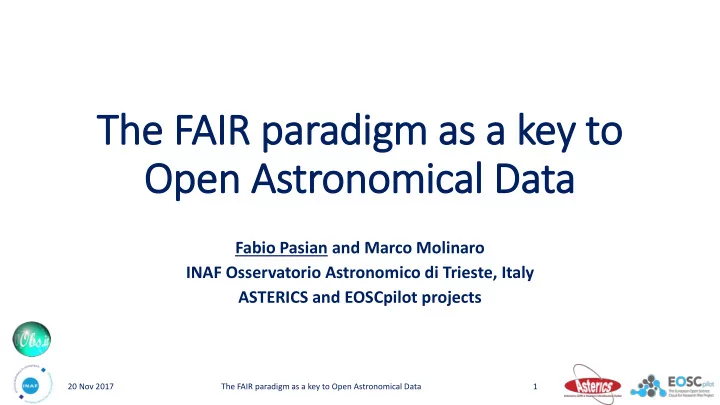

The FAIR paradigm as a key to Open Astronomical Data Fabio Pasian and Marco Molinaro INAF Osservatorio Astronomico di Trieste, Italy ASTERICS and EOSCpilot projects 20 Nov 2017 The FAIR paradigm as a key to Open Astronomical Data 1
How to implement the Open Universe tools? To implement a one-stop-shop for the Open Universe two approaches are possible: • Creation of a archive containing all data to be accessed through OU • Data preservation and curation problems ! (expertise in data quality, updates) • Cost !! • Creation of a mechanism allowing access to a distributed set of archives containing data to be shared through the OU • Such a mechanism needs to be compliant to existing standards and best practices accepted worldwide 20 Nov 2017 The FAIR paradigm as a key to Open Astronomical Data 2
Open Universe and FAIR data • Experts Meeting (Rome, 11-12 April 2017) recommended: • “For the researcher group – the Open Universe Initiative should work towards: (a) disseminating and promoting existing standards and best practices” • “ promote among data providers the adoption of the FAIR (Findable, Accessible, Interoperable, Reusable) guiding principles ” • These recommendations apply particularly to the practical implementation of the OU • to allow the data to be fetched from the participating archives • to allow data from different sources to be comparable within the OU apps 20 Nov 2017 The FAIR paradigm as a key to Open Astronomical Data 3
In other science communities … … there is a political, legal and technological debate around re-use and reproducibility of research data. Funding agencies, research institutions, coordinators of research infrastructures, individual researchers, data scientists, data librarians / curators and computing scientists are striving to identify which of the FAIR guidelines can be effectively supported by the current technologies, which national policies are supporting their implementation and what are the challenges still open towards a concrete implementation of the FAIR principles. (from the introduction to the RDA Workshop “FAIR data management: best practices and open issues ”) Firenze, 14-15 November 2016 20 Nov 2017 The FAIR paradigm as a key to Open Astronomical Data 4
FAIR principles in Astronomy: the VO (I) 20 Nov 2017 The FAIR paradigm as a key to Open Astronomical Data 5
FAIR principles in Astronomy: the VO (II) 20 Nov 2017 The FAIR paradigm as a key to Open Astronomical Data 6
FAIR principles in Astronomy: the VO (III) 20 Nov 2017 7
FAIR principles in Astronomy: the VO (IV) 20 Nov 2017 The FAIR paradigm as a key to Open Astronomical Data 8
FAIR principles in Astronomy: the VO (V) 20 Nov 2017 The FAIR paradigm as a key to Open Astronomical Data 9
20 Nov 2017 The FAIR paradigm as a key to Open Astronomical Data 10
Are all issues solved ? Data compliant with VO standards are FAIR However: • Not all of the data are VO-compliant • FAIR compliance is not enough! 20 Nov 2017 The FAIR paradigm as a key to Open Astronomical Data 11
Not all of the data are VO-compliant • To achieve data FAIRness, conversion layers need to be built for every non-VO-compliant data archive ( BIG development effort for OU ) 1. IVOA and data providers shall make efforts to jointly develop new VO standards to deal with new classes of data This already happening with most of the new large projects (in Europe through ASTERICS) and the IVOA Committee on Science Priorities 20 Nov 2017 The FAIR paradigm as a key to Open Astronomical Data 12
FAIR compliance is not enough! (I) • To be effective for OU purposes (for many science and EPO activities) some computing services need to be provided by data centers • From simple things like image cutouts catalogue building machine learning … • Need for a change: from data providers to science platform providers 2. Data providers shall make efforts to provide computing services and, with IVOA, jointly develop standards to access these new combined services (included in IVOA Registry) 20 Nov 2017 The FAIR paradigm as a key to Open Astronomical Data 13
FAIR compliance is not enough! (II) • Astronomy is an observational science any area of the sky not observed in a certain moment in time is “missing data” • “Time - dependent data should be kept forever” (G.Rossi, ESFRI Chair, 15 Nov.2017) • This is not required by FAIR principles (A2 is about metadata) 3. Data providers shall make efforts to guarantee preservation of their data over the longest possible period of time (include this in their Data Management Plans) 20 Nov 2017 The FAIR paradigm as a key to Open Astronomical Data 14
Conclusions – What can UNOOSA do? To allow the Open Universe initiative to be technically and scientifically feasible, UNOOSA shall A. promote among data providers a) long-term preservation policies b) the adoption of IVOA standards B. foster common work between IVOA and data providers for the development of new standards wherever needed (including computing as well), with the support of other interested parties 20 Nov 2017 The FAIR paradigm as a key to Open Astronomical Data 15
Thank you for your attention The European Commission is supporting ASTERICS (grant no. 653477) and EOSCpilot (grant no. 739563) in the framework of the Horizon2020 research and innovation programme. 20 Nov 2017 The FAIR paradigm as a key to Open Astronomical Data 16
Recommend
More recommend